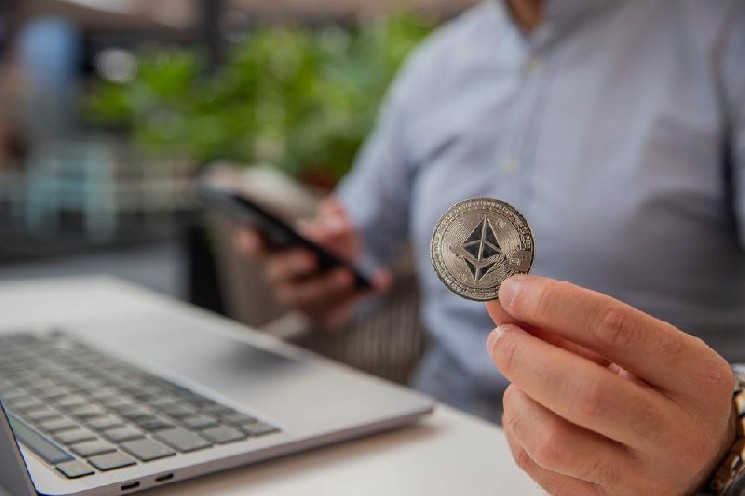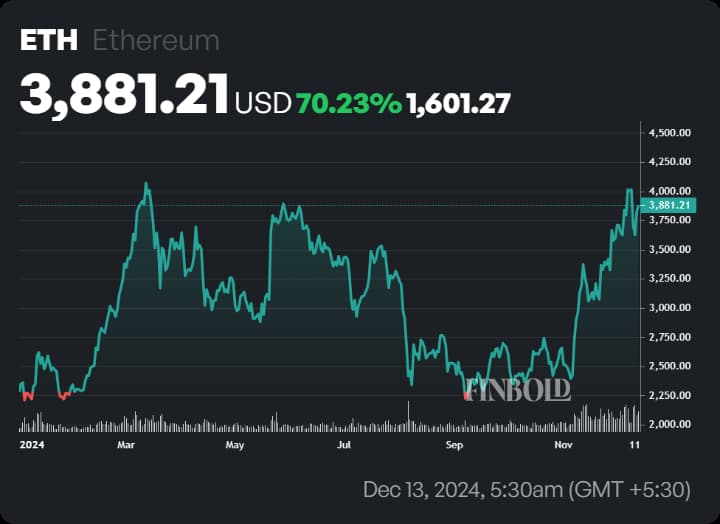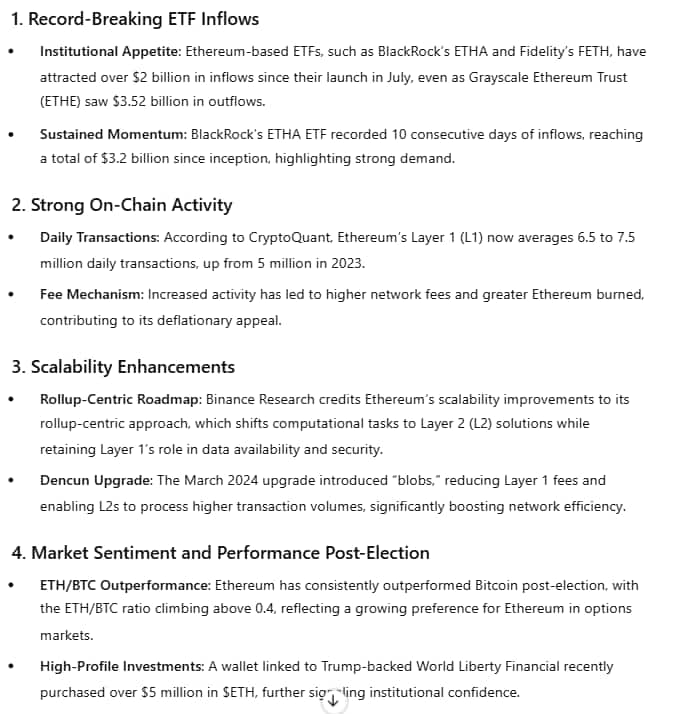ChatGPT says Ethereum price will hit this target by December 31, 2024

Ethereum (ETH) has recently crossed the $4,000 mark for the first time since March and is currently trading at $3,881.21.
With a year-to-date gain of over 70%, Ethereum has strengthened its position as a key player in the cryptocurrency market.
Driven by record ETF inflows, network upgrades, and growing institutional interest, Ethereum’s recent rise has sparked fresh discussions about its future. As 2024 nears its end, investors are closely watching to see where the world’s second-largest cryptocurrency heads next.

ETF inflows signal robust institutional confidence
One of the major catalysts for Ethereum’s recent momentum has been the renewed investor appetite for U.S.-listed spot Ethereum exchange-traded funds.
BlackRock’s (NYSE: BLK), iShares Ethereum ETF (ETHA), and Fidelity’s FETH ETF have led the surge, with both funds collectively purchasing $500 million worth of Ether earlier this week, according to Arkham Intelligence.
For instance, ETHA has recorded inflows for ten consecutive days, bringing its total to $3.2 billion since its inception, according to Farside Investors.
As of December 12, Ethereum-based ETFs have collectively attracted over $2 billion in inflows since their launch in July, despite $3.52 billion in outflows from the Grayscale Ethereum Trust (ETHE) during the same period.
This highlights the growing institutional confidence in Ethereum, reinforcing its position as a leading digital asset and a favored investment vehicle.
On-chain activity supports the bullish narrative
Ethereum’s on-chain metrics reflect robust growth, particularly on Layer 1 (L1), where daily transactions now average 6.5 to 7.5 million, up from 5 million in 2023, according to CryptoQuant.
This increase has driven higher network fees, resulting in more Ethereum being burned under its fee-burning mechanism.
Binance Research attributes this surge to Ethereum’s rollup-centric roadmap, which shifts computational execution to Layer 2 (L2) solutions while retaining Layer 1’s role in data availability and security.
A major catalyst was the March 2024 Dencun upgrade, which introduced “blobs” to reduce Layer 1 fees and allow L2s to process higher transaction volumes. This upgrade has significantly improved network efficiency and boosted activity.
However, the lower Layer 1 fees have impacted Ethereum’s burn rate, pushing the network toward an inflationary state.
While this shift has tempered enthusiasm among some investors, experts view it as a temporary effect of scaling upgrades that expanded blockspace supply faster than demand.
Despite these challenges, Ethereum’s issuance rate remains below 1%, much lower than rival blockchains, suggesting deflationary trends could resume as demand recovers.
Ethereum outshines Bitcoin in post-election rally
Following the U.S. elections, Ethereum has consistently outperformed Bitcoin (BTC), with the ETH/BTC ratio climbing above 0.4.
This trend reflects a growing preference for Ethereum as traders favor ETH in options markets. Bybit’s December 5 Volatility Review further highlights this shift, noting a stronger bullish sentiment in ETH options pricing compared to Bitcoin.
Adding to this momentum, a wallet linked to Trump-backed World Liberty Financial has been accumulating $ETH, alongside a few other crypto assets, with purchases exceeding $5 million.
This activity has pushed the wallet’s total crypto holdings to over $72 million, further underscoring the increasing institutional confidence in Ethereum as a key digital asset.
ChatGPT’s Ethereum price outlook for December 31, 2024
Based on a confluence of factors, including strong ETF inflows, heightened on-chain activity, and robust institutional demand, ChatGPT projects that Ethereum could reach $5,000 by December 31, 2024.

CryptoQuant analysts echo this optimism, suggesting Ethereum could rally to $5,200 if current trends persist, driven by robust demand and supply dynamics.
These forecasts strengthen the foundation for Ethereum’s growth, particularly as network upgrades and institutional interest continue to drive momentum in the market.
Featured image via Shutterstock




 Bitcoin
Bitcoin  Ethereum
Ethereum  Tether
Tether  Dogecoin
Dogecoin  USDC
USDC  Cardano
Cardano  TRON
TRON  Chainlink
Chainlink  Stellar
Stellar  Hedera
Hedera  Bitcoin Cash
Bitcoin Cash  LEO Token
LEO Token  Litecoin
Litecoin  Cronos
Cronos  Ethereum Classic
Ethereum Classic  Monero
Monero  Dai
Dai  Algorand
Algorand  OKB
OKB  Cosmos Hub
Cosmos Hub  Stacks
Stacks  Theta Network
Theta Network  Gate
Gate  Maker
Maker  KuCoin
KuCoin  Tezos
Tezos  IOTA
IOTA  NEO
NEO  Zcash
Zcash  Polygon
Polygon  Synthetix Network
Synthetix Network  Tether Gold
Tether Gold  TrueUSD
TrueUSD  Dash
Dash  Holo
Holo  Zilliqa
Zilliqa  Enjin Coin
Enjin Coin  0x Protocol
0x Protocol  Qtum
Qtum  Basic Attention
Basic Attention  Siacoin
Siacoin  Ravencoin
Ravencoin  Bitcoin Gold
Bitcoin Gold  Decred
Decred  NEM
NEM  DigiByte
DigiByte  Ontology
Ontology  Nano
Nano  Status
Status  Hive
Hive  Waves
Waves  Huobi
Huobi  Lisk
Lisk  Numeraire
Numeraire  Steem
Steem  Pax Dollar
Pax Dollar  BUSD
BUSD  OMG Network
OMG Network  Ren
Ren  Bitcoin Diamond
Bitcoin Diamond  Bytom
Bytom